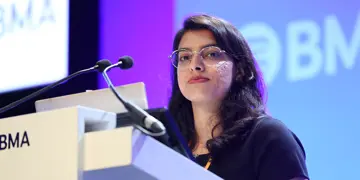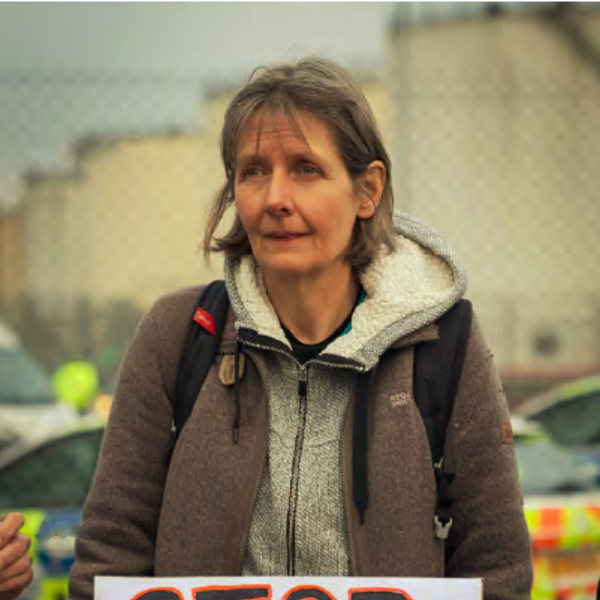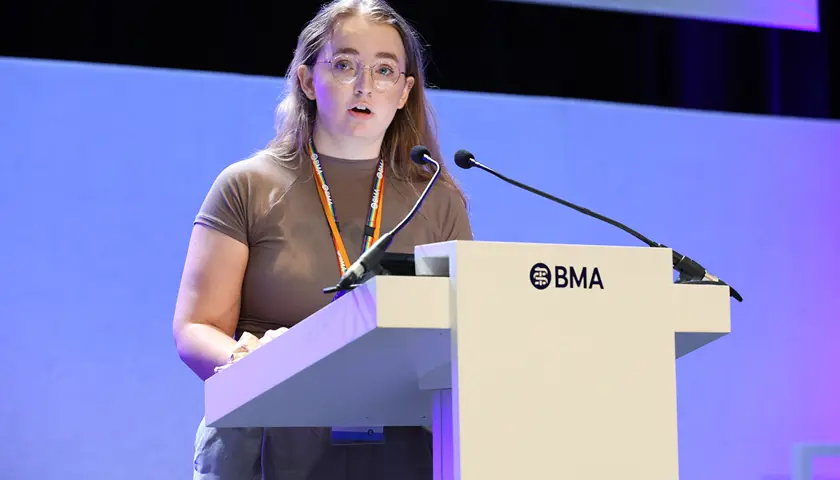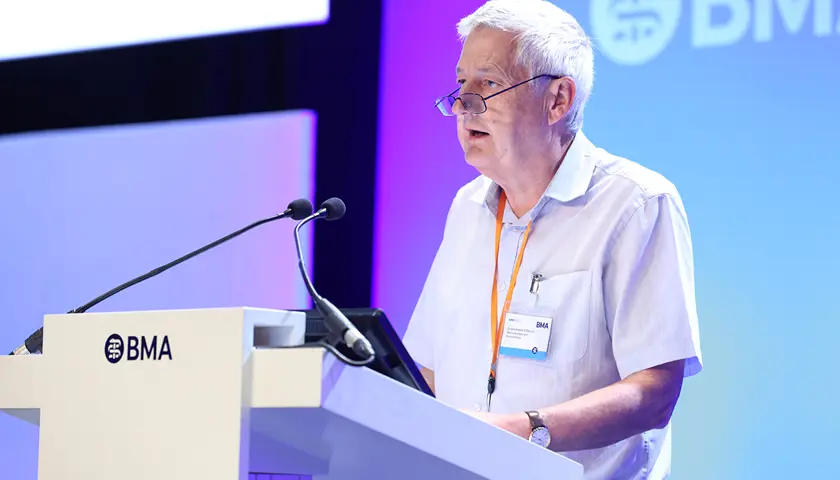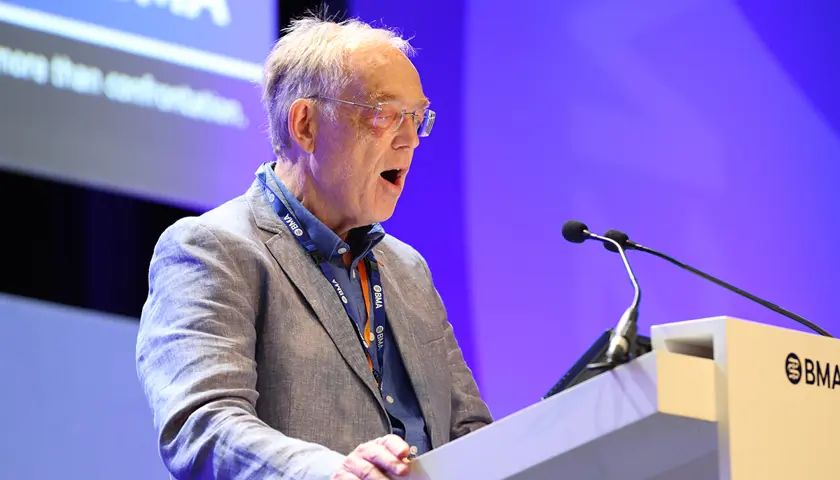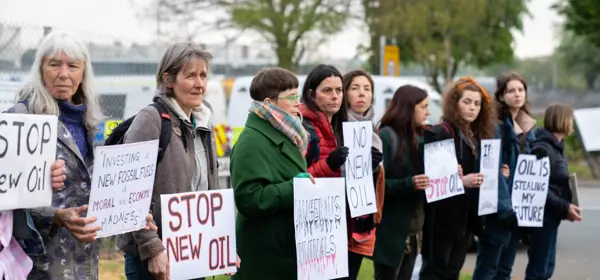BMA votes to protect medical professionals from GMC sanctions for activism
BMA votes to protect medical professionals from GMC sanctions for activism
‘No doctor should ever be afraid to stand up for what they believe in,’ ARM told
‘No doctor or medical student should ever be afraid to stand up for what they believe in,’ BMA members were told before they voted in favour of protecting doctors’ rights to engage in activism without facing a risk to their licences to practise.
Doctors at the BMA annual representative meeting agreed on ‘safeguarding the rights of healthcare workers and medical students engaged in activism’, believing that ‘such participation is fundamental to health equity and reducing inequalities’.
It calls for the BMA to advocate for protections against punitive actions such as being struck off the medical register or termination of employment for doctors participating in activism.
The motion follows the recent decision by a Medical Practitioners Tribunal Service tribunal to suspend climate activist and GP Sarah Benn’s GMC registration for five months, which the BMA is supporting her to appeal.
‘This incident underscores a disturbing trend where healthcare professionals face punitive actions for participating in activism which is fundamental in advocating for public health and safety,’ said Afshan Akhtar, who tabled the motion.
The motion calls for the BMA to work with the GMC to develop guidelines that protect doctors’ rights to protest and express themselves lawfully, ‘especially in contexts relevant such as climate change’ and ensure mechanisms are in place to support healthcare workers who face discrimination or retaliation owing to their activism.
Dr Akhtar said it was intended to ‘protect those amongst us who stand up for what is right’, adding that doctors are ‘both healthcare professionals and members of broader society’.
She said the motion was ‘a necessity’ for tackling health inequalities, not just within the UK but globally'.
‘We must ensure that our voices dedicated to the welfare and betterment of society are not stifled but encouraged and protected,’ Dr Akhtar added.
‘The essence of this motion is not just about protecting individual rights, but ensuring that healthcare professionals can actively contribute to societal change without fear.
‘Let us continue to be leaders, not only in treating patients but also in advocating for a healthier, just and equitable world.’
Medical student Bethan Stanley, who spoke in favour of the motion, said the motion could be applied to other forms of activism such as the war in Gaza which she has protested over in recent months.
‘For me, and many of my colleagues, it’s because of our medical backgrounds that we feel so strongly that we have a duty to stand up and speak up against the ongoing atrocities in Palestine,’ she told the BMA’s representative body.
‘It’s because we care about protecting and saving human life that we cannot stay silent. Yet for so many medics, particularly those from ethnic minority and Muslim backgrounds, they have been or are being threatened with repercussions to their medical career for doing so.
‘Standing up for what we believe in does not make us bad doctors. If you ask me, it actually makes us better. I personally would prefer to be cared for by a doctor who isn’t afraid to stay silent when they see that things are going wrong.’
Ms Stanley noted how, outside of political activism, doctors are actively encouraged to stand up for what is right – for example through active bystander training.
‘No doctor or medical student should ever be afraid to stand up for what they believe in,’ she said.
Miss Stanley argued the motion is not just for individual issues such as climate change or Gaza, but ‘is relevant to so many things as doctors’.
Urging BMA members to vote in favour, she said doctors should be able to represent their views ‘without being afraid of losing the careers that we all care so deeply about’.
John O’Driscoll, who spoke against the motion, said he agreed with the principle of free speech but warned: ‘It’s all very well if you think the activism is laudable, like climate change for example. But what if, in your view, the activism isn’t so laudable?’ He gave examples of activism by terrorists or ‘extreme religious activism’.
He said: ‘Doctors should be subject to the laws of the land, the same as anyone else, and the GMC should take this into account.’
Retired doctor Thomas Kinloch accepted that freedom of speech and peaceful protest were ‘fundamental and absolute human rights’ but argued that: ‘Cooperation, communication and consensus will always achieve more than confrontation.’
He said: ‘There is activism and activism. Actions have consequences, and if you choose to cover Stonehenge in yellow powder or glue yourself to the road that’s your choice not mine.
‘As doctors, our professional standards rightly require us to act with integrity and compassion and make our patients’ care our priority. When a doctor chooses to participate in unlawful activities, particularly activities that may in themselves be detrimental to patient care, activism is in my opinion not defendable.
‘This motion fails to differentiate reasonable actions from unreasonable actions and suggests that all activism should be safeguarded. I cannot support that.’
Responding to the arguments against the motion, Dr Akhtar said any demonstration that fell into hate speech would undermine existing BMA values and policy, so would not be supported if the motion passed.
The motion was carried in three parts, with all passing comfortably.


